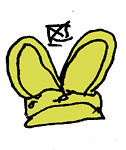
In 1974, as a precocious and surely annoying little sixth-grader, I won the Nebraska Elementary School (K-6) Chess Championship on a tiebreak. The tournament was held in the campus student union building of the University of Nebraska at Lincoln. My mother drove me the 120 miles from our house in Kearney to the tournament. The trophy is moldering in my parents' basement somewhere.
Chess was popular at that time in the US because of the publicity surrounding the Bobby Fischer vs Boris Spassky world championship match. This match been held in 1972 in Reykjavik, Iceland. Even my hometown had a chess club.
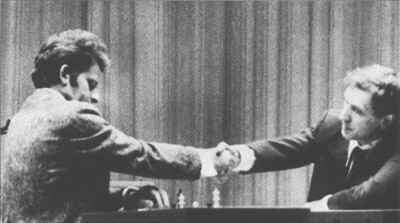
I also independently won a lottery drawing for a chess set that was held the same day. It was my lucky day.
But I was not a very good chess player at that time, even for my age.
After years of study and many thousands of games of blitz chess played over the Internet against people from all over the world, I have managed to improve—yes!—not even the slightest bit. I still play chess exactly like a precocious and annoying little sixth grader.
Yet I play on.
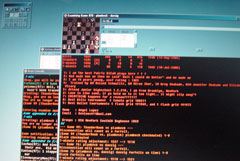
Today, I play at Internet Chess Club (ICC) [website].
I prefer ICC "bullet" games——they have a 60 second time control. That's one move per second if you hope to squeeze in a sixty move game.
It's Tetris on steroids. If you run out of time, you lose automatically.
I'm ashamed to say that I've played more than 30,000 games of these rapid-fire chess games over the Internet since 1998. That's roughly 15-20 games per day.
Since each game only takes 2 or 3 minutes, perhaps that is not so bad. At least I'm not watching TV.
If you want to see some of my most recent insults to the game of chess (probably even today's games!), click here.

The Plambeck Fianchetto Attack
In bullet games—as in regular chess—people will often try to anticipate their opponent's next move. But in bullet, a person might even try to make his next move instantly, without even looking at the opponent's last one. In the opening, a person sometimes completes three or four moves in the first elapsed second.
I've developed some foils for such opponents.
For example, as White in a bullet game after 1. e4 b6, I'll often venture to play 2. Ba6?!!, a rather dubious continuation that I've christened the Plambeck Fianchetto Attack. White prays to his God that Black is about to plunk his c8 bishop down at b7 without really waiting to look at White's second move.
In fact, this absurd prayer is often answered. Black hurriedly plays 2 ... Bb7 and I calmly reply 3. Bxb7 (see diagram). The kamikaze bishop will move on to assassinate the Black rook in its next move.
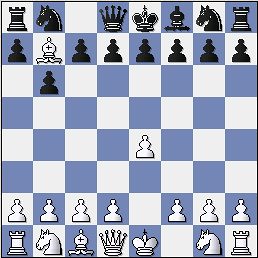
plambeck
When this worked (and it still does), I used to send a message to my opponent reading:
But I eventually decided that was kind of antisocial, and stopped doing it.

The Cyber Annotator
I'm also interested in chess-playing computer programs and devices. Just about everything seems to play chess nowadays.
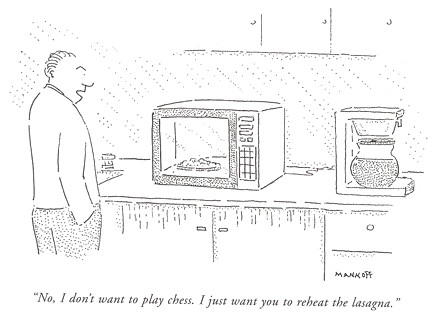 .
.
Today's computer chess programs are too strong for all but the very best humans. Back in 1996 it was still possible to score a victory against personal computer programs such as Fritz 4 (and even have them annotate it for you, afterwords).
On 14 May 2000 I was playing a bullet game at the Internet Chess Club as White against a player with the handle "craigh." We reached the following position after Black's 20th move.
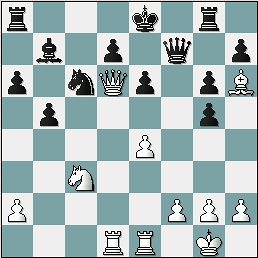
plambeck
I was pleased to find 21. Nd5!, when the game continued 21 ... exd5 22. exd5+ Kd8 23. dxc6 Bxc6 24. Qxc6 Re8 25. Bxg5+ Re7 and Black resigned after move 27.
I decided to look at the entire game using the chess playing computer program Fritz 6, which I had purchased some time before, but hardly ever used. Turning on its "automatic annotator" feature for the first time, I was amazed to find that the program automatically generated the comment
It was eerie to find a desktop computer offering such an accurate aesthetic judgement. Will future computers be offering equally unearthly commentary on human creations in the arts, perhaps on music or literature?